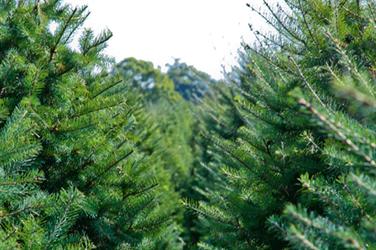Market report - Christmas trees
 Demand for real Christmas has never been greater but growers warn that meeting demand could prove to be a struggle this year, Graham Clarke reports.
Demand for real Christmas has never been greater but growers warn that meeting demand could prove to be a struggle this year, Graham Clarke reports.
More than eight million Christmas Trees were sold into the UK market in 2011 - image: BCTGA
There is a major predicament facing the UK Christmas tree market in 2012. On the plus side, there is plenty of demand for real trees. In fact, it has never been greater - millions of consumers prefer "the real thing" with the smell of pine greeting them as they come down on Christmas morning. You do not get this feature with environmentally-dubious artificial trees.
According to the British Christmas Tree Growers Association (BCTGA), in 2011 more than 8.2 million real Christmas trees were sold into the UK market. But the downside - for this year and the next few at least - is that stock is unlikely to be available to meet this demand. Trees in the 2m-plus range particularly are going to be in short supply.
There are three main reasons for this. The first is the weather - not in the UK, but in Scandinavia and the north European mainland. Sweden, Germany, France, Belgium and Austria experienced abnormally severe late spring frosts and these have devastated as much as a quarter of this year's harvest.
Lincolnshire grower Peter Strawson says: "I've heard that of the 200,000 trees to come out of Sweden, some 50,000 of them have been lost due to late frosts. This will add unprecedented pressure on demand in the UK." The cold weather has also had an impact on tree supply from Finland and Norway, but very few trees are imported from those countries in comparison to Sweden.
The second reason for this year's expected shortfall comes as a direct result of overcutting in previous years. It takes six-to-eight years to grow a spruce or fir to 2m, and in the past few years growers have cut early to meet demand that year. The knock-on effect is that fewer taller trees are now available.
"More people than ever want trees of those sizes," says newly-appointed BCTGA secretary Harry Brightwell. "People love Christmas and want the biggest tree they can get."
Shortage explained
Former BCTGA chair Sadie Lynes, who runs Berkshire-based Jadecliff as both a grower and importer of Christmas trees, confirms: "In recent years, growers have tended to overcut rather than letting the trees grow on and this is causing a shortage now." Strawson says he has never seen such a shortage and he has farmed 50ha of Norway spruce, Fraser fir and Nordmann fir since 1977. "It is going to be a very difficult year, both for retailers in locating a plentiful stock of good quality and for the customers who won't be able to find what they want. I've not seen a year like it."
Eden Park is the largest grower and supplier of Christmas trees in Europe. Part of the Green Team Group, it supplies 400,000 trees to garden centres and other retailers across the UK, while Scottish plantations bring another 250,000 to the wholesale market. Sales manager Martin Coward agrees that there will be further shortages of trees above 2m and consequent price rises, although he says prices for trees under 175cm should remain stable.
Swindon-based Needlefresh distributes 500,000 trees annually from a network of growers. Managing director Christopher Hood points out that there is not always so much incentive for growers to stock bigger trees because, being more difficult to harvest and transport, they are generally less profitable.
The third reason for this year's shortfall is the ongoing impact of current season needle necrosis (CSNN). This serious foliage disorder, which causes needles on fir trees, particularly Nordman, to turn brown and fall off, has been monitored in Europe and North America for more than 20 years. But it is only within the past decade that it has affected UK crops - mainly in the south.
Necrosis losses
Strawson says: "The fungus Sydowia polyspora may be to blame, but it is not known what causes it and how it can be prevented." Lynes adds: "It happens soon after bud break. Needles develop chlorotic spots or bands that later turn necrotic." HA Trim is one of the country's biggest growers, farming 600,000 Nordmann firs in Kent and Surrey. Owner Hans Alexandersen says he has "lost several hundred thousand pounds' worth of trees".
At the Tree Barn in Oxfordshire, which won last year's BCTGA competition for best tree - and therefore supplied 10 Downing Street - grower Andrew Ingram says: "Although people are beginning to research CSNN, we expect to lose about 10 per cent of our crop a year. We just have to write it off. From one year to the next the trees seem to recover, but then they get it again."
Alexandersen agrees. "The trees can recover from CSNN in future years, but when you have a plantation with the disease, you don't want to leave too many trees," he says.
There could be good news for growers if, as is suspected in some quarters, the weather has a part to play in CSNN. Janet Allen of consultancy firm ADAS likens the disease to sunburn. "We are pretty certain that the cause is a fungus but we don't know how it spores, and we need to monitor climatic conditions before we can control it," she says. "In the summers of 2010 and 2011 the hot, dry and bright weather in late June and July seem to have led to the fungus being active." If this is true, the summer of 2012 is likely to be bad for the fungal spores and good for the Christmas tree crops. But Hood offers a word of warning. "CSNN has been monitored for a number of years and the one thing we can say for certain is that it performs in unexpected ways," he says. "So there is no guarantee whatsoever that this year's problem will be lessened because of the wetter weather."
Educating retailers and consumers
Retailers Needle drop (as opposed to current season needle necrosis) occurs after the tree has been cut. Needlefresh managing director Christopher Hood says his aim is to get trees into retail outlets within four days of being cut. "There was more needle drop in 2011, which was a result of the warm autumn that caused additional stress on trees between when they were cut and when they were sold into retailers. It is so important, for our industry as well as for the consumer, to ensure that trees are delivered on a just-in-time basis."
He adds: "Garden centres demanding trees earlier and earlier tends to damage public confidence in the market. Unless retailers accept that they can't have their trees until the end of November at the earliest, we run the risk of spoiling the industry because trees become less saleable as the climate gets warmer."
Another element where retailers need to be better informed, says Hood, is in the maintenance of the trees after delivery. "More and more garden centres are storing trees under cover. This dries them out, even before they get placed in someone's home," he explains. "We recommend that they are kept in the open, not in bags, and watered overhead once a day. Some retailers get it right, while others get it so wrong."
CONSUMERS Eden Park sales manager Martin Coward says educating consumers about how to look after for their trees at home is hugely important. The Green Team Group, of which it is part, includes informative labels about how the tree was grown along with care instructions.
"It was more important than ever in 2011 that the consumer knew how to look after their purchase," says Coward. "The retailers that took time to explain about the trees' aftercare received minimal complaints and customer returns."
Needlefresh managing director Christopher Hood is also determined to get this message across to consumers. "Care instructions are given with our trees and our website also has detailed information. We regularly inform retailers to spread good care advice to their customers. If their trees last well, they will come back year after year for real trees."
Managerial mandate
Name: Harry Brightwell
Job: Secretary, British Christmas Tree Growers Association
Harry Brightwell has just taken on the role of secretary following the retirement of Roger Hay, who had been in the post for almost 15 years.
Brightwell runs Fynn Valley Care Farm near Ipswich in Suffolk. "It is really a small-holding of eight-to-nine acres with a few animals and a small Christmas tree business," he says. "The main aim is to provide a therapeutic facility for people with depression and other mental illnesses."
Brightwell took on Fynn Valley and its Christmas tree farm following early retirement as a public-sector IT manager. "I didn't know much about Christmas trees so joined the BCTGA to learn more," he explains.
When Hay announced his retirement, Brightwell applied and was chosen for his managerial experience and IT skills, with a mandate to drive the association forward.
He says: "I can't pretend to have Roger's knowledge of the market. But what I can bring to the table is a fresh approach and some new skills so that we can make the industry even better for both the growers and the end users of the trees. There are interesting times ahead, with increased production and current season needle necrosis being just two of the main challenges."
Main Menu
Latest News
- Types of Trees Used
Both natural and artificial trees are used as Christmas trees....
- Fresh Christmas Tree
When a Christmas tree is cut, over half of its weight is water. With proper care, you can maintain th...

 Sales Tel.: 18675505823
Sales Tel.: 18675505823 Contact: Miss Hao
Contact: Miss Hao

 by Height
by Height